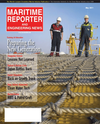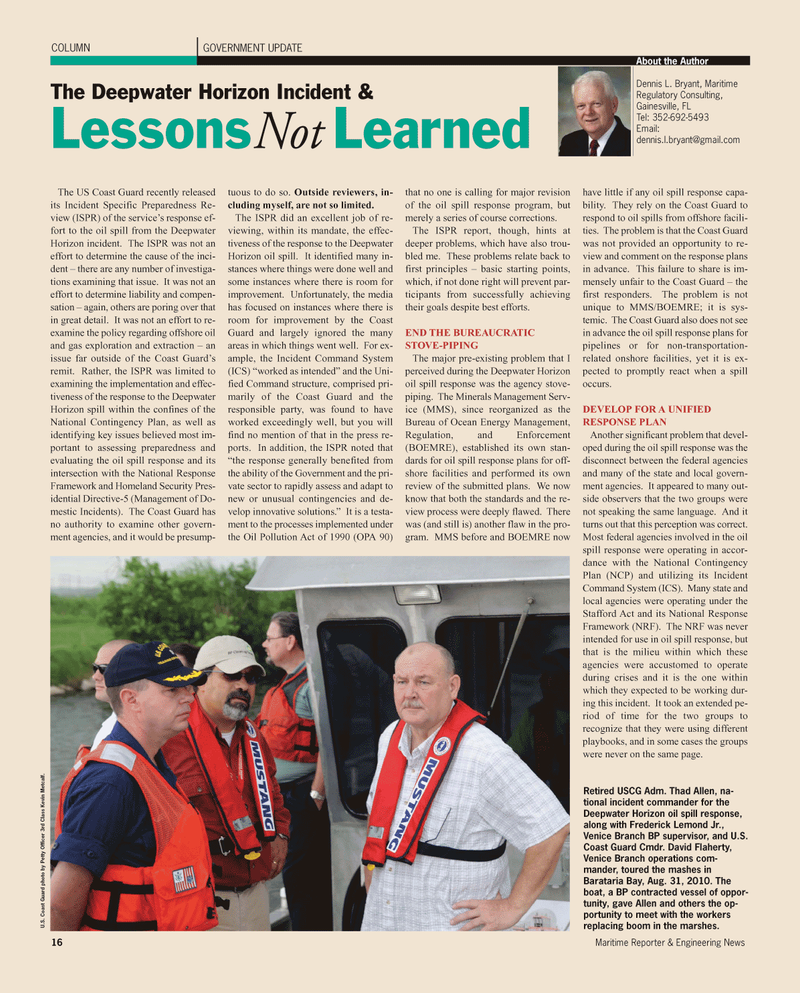
Page 16: of Maritime Reporter Magazine (May 2011)
Training & Education Edition
Read this page in Pdf, Flash or Html5 edition of May 2011 Maritime Reporter Magazine
16 Maritime Reporter & Engineering News
The US Coast Guard recently released its Incident Specific Preparedness Re- view (ISPR) of the service’s response ef- fort to the oil spill from the Deepwater
Horizon incident. The ISPR was not an effort to determine the cause of the inci- dent – there are any number of investiga- tions examining that issue. It was not an effort to determine liability and compen- sation – again, others are poring over that in great detail. It was not an effort to re- examine the policy regarding offshore oil and gas exploration and extraction – an issue far outside of the Coast Guard’s remit. Rather, the ISPR was limited to examining the implementation and effec- tiveness of the response to the Deepwater
Horizon spill within the confines of the
National Contingency Plan, as well as identifying key issues believed most im- portant to assessing preparedness and evaluating the oil spill response and its intersection with the National Response
Framework and Homeland Security Pres- idential Directive-5 (Management of Do- mestic Incidents). The Coast Guard has no authority to examine other govern- ment agencies, and it would be presump- tuous to do so. Outside reviewers, in- cluding myself, are not so limited.
The ISPR did an excellent job of re- viewing, within its mandate, the effec- tiveness of the response to the Deepwater
Horizon oil spill. It identified many in- stances where things were done well and some instances where there is room for improvement. Unfortunately, the media has focused on instances where there is room for improvement by the Coast
Guard and largely ignored the many areas in which things went well. For ex- ample, the Incident Command System (ICS) “worked as intended” and the Uni- fied Command structure, comprised pri- marily of the Coast Guard and the responsible party, was found to have worked exceedingly well, but you will find no mention of that in the press re- ports. In addition, the ISPR noted that “the response generally benefited from the ability of the Government and the pri- vate sector to rapidly assess and adapt to new or unusual contingencies and de- velop innovative solutions.” It is a testa- ment to the processes implemented under the Oil Pollution Act of 1990 (OPA 90) that no one is calling for major revision of the oil spill response program, but merely a series of course corrections.
The ISPR report, though, hints at deeper problems, which have also trou- bled me. These problems relate back to first principles – basic starting points, which, if not done right will prevent par- ticipants from successfully achieving their goals despite best efforts.
END THE BUREAUCRATIC
STOVE-PIPING
The major pre-existing problem that I perceived during the Deepwater Horizon oil spill response was the agency stove- piping. The Minerals Management Serv- ice (MMS), since reorganized as the
Bureau of Ocean Energy Management,
Regulation, and Enforcement (BOEMRE), established its own stan- dards for oil spill response plans for off- shore facilities and performed its own review of the submitted plans. We now know that both the standards and the re- view process were deeply flawed. There was (and still is) another flaw in the pro- gram. MMS before and BOEMRE now have little if any oil spill response capa- bility. They rely on the Coast Guard to respond to oil spills from offshore facili- ties. The problem is that the Coast Guard was not provided an opportunity to re- view and comment on the response plans in advance. This failure to share is im- mensely unfair to the Coast Guard – the first responders. The problem is not unique to MMS/BOEMRE; it is sys- temic. The Coast Guard also does not see in advance the oil spill response plans for pipelines or for non-transportation- related onshore facilities, yet it is ex- pected to promptly react when a spill occurs.
DEVELOP FOR A UNIFIED
RESPONSE PLAN
Another significant problem that devel- oped during the oil spill response was the disconnect between the federal agencies and many of the state and local govern- ment agencies. It appeared to many out- side observers that the two groups were not speaking the same language. And it turns out that this perception was correct.
Most federal agencies involved in the oil spill response were operating in accor- dance with the National Contingency
Plan (NCP) and utilizing its Incident
Command System (ICS). Many state and local agencies were operating under the
Stafford Act and its National Response
Framework (NRF). The NRF was never intended for use in oil spill response, but that is the milieu within which these agencies were accustomed to operate during crises and it is the one within which they expected to be working dur- ing this incident. It took an extended pe- riod of time for the two groups to recognize that they were using different playbooks, and in some cases the groups were never on the same page.
COLUMN GOVERNMENT UPDATE
The Deepwater Horizon Incident &
LessonsNot Learned
About the Author
Dennis L. Bryant, Maritime
Regulatory Consulting,
Gainesville, FL
Tel: 352-692-5493
Email: [email protected]
Retired USCG Adm. Thad Allen, na- tional incident commander for the
Deepwater Horizon oil spill response, along with Frederick Lemond Jr.,
Venice Branch BP supervisor, and U.S.
Coast Guard Cmdr. David Flaherty,
Venice Branch operations com- mander, toured the mashes in
Barataria Bay, Aug. 31, 2010. The boat, a BP contracted vessel of oppor- tunity, gave Allen and others the op- portunity to meet with the workers replacing boom in the marshes.
U.S. Coast Guar d photo by Petty Of ficer 3r d Class Kevin Metcalf.

 15
15

 17
17
